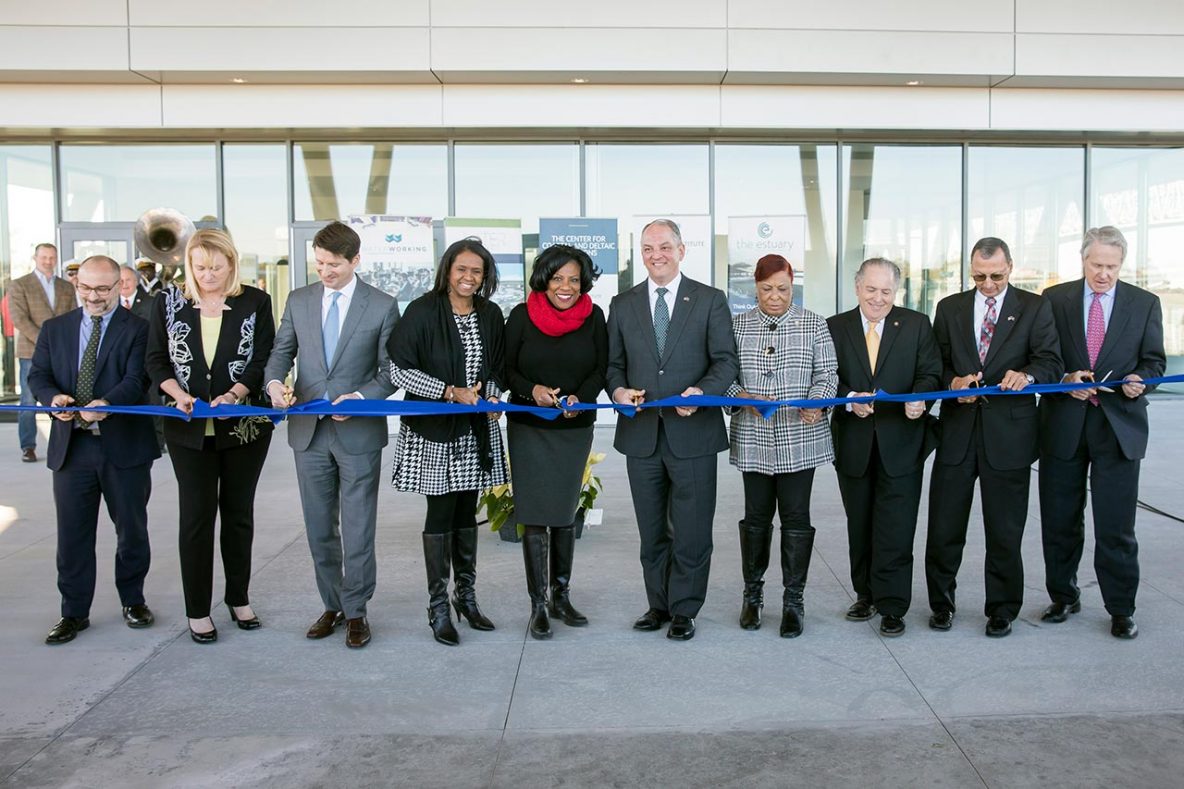New Center for Coastal & Deltaic Solutions and the Water Institute of the Gulf Are Now Open for Business
BATON ROUGE, La. — Today, Governor John Bel Edwards and the Baton Rouge Area Foundation President/CEO, John Davies were joined by Mayor President Sharon Weston Broome and Justin Ehrenwerth, CEO/President of The Water Institute of The Gulf, in a ribbon cutting ceremony for the $25 million Center for Coastal & Deltaic Solutions. Dignitaries and guests watched as a ribbon was cut to officially open the building.
“Capitalizing on Louisiana’s growing stature as a center of global water management research and development, this iconic building contributes to the Baton Rouge skyline, marks the rebirth of the city’s former municipal dock, and serves as a focal point for the important work being done to save our coast,” Gov. Edwards said. “This project is the quintessential example of the impact we can make on our future through strategic investments in public-private partnerships.”
This event marks the third building on The Water Campus with two others set to break ground by year end. The 34,000 square-foot building designed by architects, Coleman Partners and Perkins+Will, will consist of office space on the second floor while also housing a 6,000 square-foot conference center on the third floor. The Estuary Conference and Event Venue will be play host to academic conventions, research conferences, as well as serve as an event venue for corporate events and private receptions. The first floor is a shared co-working space known as Waterworking.
The Water Campus, currently a $60 million urban development in downtown Baton Rouge, is the home of the Center for Coastal & Deltaic Solutions and The Water Institute of The Gulf, the Coastal Protection and Restoration Authority as well as the LSU Center for River Studies. The Campus is a catalyst for development along the Nicholson Corridor between downtown and LSU. It will provide a strategic location for future interaction between both regional, national and international coastal, environmental and water-related stakeholders, such as state and federal agencies, educational and research institutions and engineering, environmental, planning and consulting firms, as well as nonprofit advocates.
“This building fulfills another milestone in our commitment to position Louisiana as a leader in the coastal solutions water sector. The Center for Coastal & Deltaic Solutions will propel Louisiana onto the cutting-edge of coastal protection innovation, with Baton Rouge serving as a thriving landmark for major businesses and restoration projects,” said Davies.
The building is located on the old Baton Rouge Municipal Dock Property (approximately 11 acres) – constructed in 1926 for $550,000. It enabled ocean-going vessels to off-load heavy cargo onto barges for upriver transport, or to rail for inland shipment through Baton Rouge. With the construction of the port facility on the west bank of the Mississippi River in Baton Rouge, the old City Dock was no longer in service by 1968.
“I am extremely excited about the possibilities that this campus will bring to our great capital city,” Mayor-President Sharon Weston Broome said. “Not only will it add to our skyline, but it will add to our educational, research, real estate, business and tourism offerings. Also, as this facility grows, our economy also grows. This is indeed an impressive development for the city and parish, and showcases the importance of water in this area and beyond.”
“We are delighted to move into this iconic building on the river and are excited to see it become a focal point for scientists from across the state and around the world,” said Justin Ehrenwerth, President and CEO of The Water Institute of the Gulf. “As The Water Campus grows, this new building will serve as the gathering place for the best scientists, engineers, and researchers as we collectively work toward making communities and economies more resilient in the face of an uncertain future.”
“This Center will house some incredible scientific minds working to identify solutions to address Louisiana’s coastal state of emergency,” said CPRA Chairman Johnny Bradberry. “But while we pause here for a few moments today, the crisis on our coast does not pause. Land loss continues, and that is why we continue to work day in and day out with a great sense of urgency, implementing projects, creating tens of thousands of acres of land and marsh, restoring our barrier islands, and building defenses to save what makes Louisiana the unique place we call home.”
The Water Campus is a public and private partnership between the state of Louisiana, the city of Baton Rouge, LSU, and the Coastal Protection & Restoration Authority along with the Baton Rouge Area Foundation and Commercial Properties Realty Trust which has extensive development, redevelopment and project management experience.

